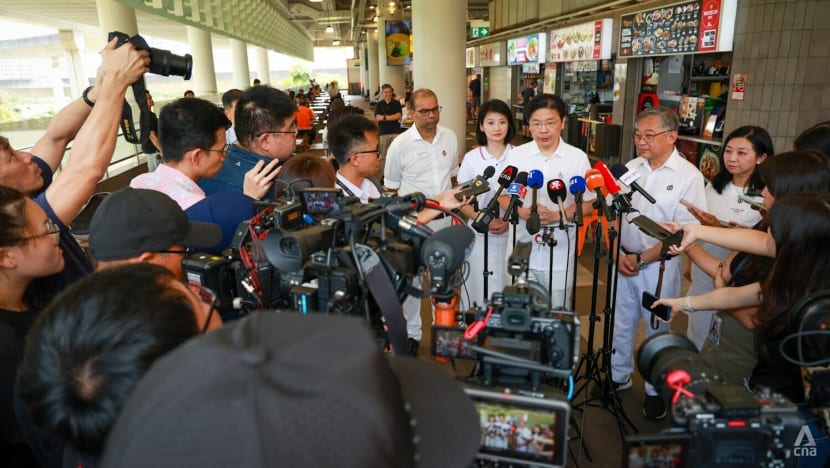Digital platforms of traditional media most relied upon during GE2025: IPS study
The IPS study also found that podcasts gained traction among older voters during what some have dubbed as Singapore’s first “podcast election”.


This audio is generated by an AI tool.
SINGAPORE: Voters in this year's General Election turned primarily to the digital platforms of Singapore’s traditional mass media for information, a study by the Institute of Policy Studies (IPS) has found.
Conducted in collaboration with the National University of Singapore's (NUS) communications and new media department, the study also revealed that legacy media outlets were considered more trustworthy than non-legacy platforms or personal communications during the hustings.
This year’s election, which marked Prime Minister Lawrence Wong’s first as head of the People’s Action Party (PAP), saw the ruling party retain power with 65.57 per cent of the popular vote.
The IPS study, released on Tuesday (Sep 2), also found that social media was used more often than party channels for learning about or interacting with candidates.
The surveys, conducted between May 5 and 20 with 2,071 respondents, were led by NUS communications and new media head Associate Professor Natalie Pang, deputy head Associate Professor Carol Soon and IPS research assistant Samantha Quek.
They surveyed 2,071 respondents from May 5 to 20 this year.
TRADITIONAL MEDIA REIGNS SUPREME
Interest in the election was high – 74 per cent of respondents said they were very or extremely interested, up from 66 per cent in 2020.
Both PAP and opposition voters turned more frequently to legacy media than non-legacy platforms.
Assoc Prof Soon explained that legacy media refers to traditional outlets that predate the digital era, such as CNA, the Straits Times and Lianhe Zaobao, which now also operate in digital formats. Non-legacy media includes digital-only news sites such as Mothership and Rice Media, podcasts such as Political Prude, Yah Lah But and the Daily Ketchup, and online forums such as Reddit and HardwareZone.
“Back to 2015 or even the 2011 elections, the cyberspace was typically associated with the wild wild west. You heard a lot of dominant, loud opposition voices,” she said.
“But today, we don't see that. Based on our findings, both PAP voters and opposition voters are using legacy media more than non-legacy media. It speaks to this normalisation. So it's going to be a bit even harder to draw that cause and effect between media use and voting behaviour.”
As in GE2020, the top three media sources during GE2025 remained consistent: online platforms of mass media ranked first, followed by television and local digital-only news sites.
Across all age, income and education groups, the digital formats of Singapore’s legacy media served as the primary source of election information.
However, among voters aged 21 to 34, TikTok replaced television as the second most used platform.
Overall, nearly half of all respondents said they used the websites, apps or podcasts of Singapore's mass media daily during the election campaign period, making legacy media an “all-rounder” across demographic lines.
Trust levels rose across all communication channels. Local radio stations and their digital platforms were rated most trustworthy, followed by local newspapers and their digital platforms, then local television stations and their digital platforms.
A PODCAST ELECTION?
This year’s hustings also saw politicians, including Mr Wong, take to podcasts to appear more relatable. The trend led some to call GE2025 Singapore’s first “podcast election”.
Assoc Prof Soon said that podcasts are still considered the “new kid on the block compared to the other established media sites”.
“If you look at the different percentages in terms of use among youths for podcasts, YouTube and TikTok, it kind of suggests maybe there's a TLDW at play – too long, didn’t watch,” she added. “It highlights the importance for communicators to repurpose content, say, into shorter videos.”
Assoc Prof Pang said it was not straightforward to label GE2025 a podcast election, as voters engaged with media in different ways beyond direct political content. These included expressive engagement, such as posting opinions about candidates.
She noted that podcasts mattered more to some groups, especially older voters. Among those aged 60 and above, more than a third of the respondents said they used podcasts to express their views daily, such as sending in their comments to the platforms or commenting on their social media.
This makes podcasts the most used platform for that purpose, ahead of social networking sites and TikTok.
She added that traditional outreach, such as printed or electronic party brochures, still mattered for older voters. “I think it actually is still important for particular groups, especially older folks who are not always online,” she said.
The study found that while party brochures ranked lower than most other media platforms, they remained a more significant source of information for older Singaporeans than for younger respondents.















